"My community burned in a wildfire." Navigating loss and resilience after climate disaster.
Plus a note on resisting right-wing efforts to get us to shut up.
I read another post, watch another video, about how sad and disillusioned we’re all feeling about The State of the World and I find myself… bored.
We’re seeing a version of the tactic well outlined by Naomi Klein in The Shock Doctrine. In the original shock doctrine, governments seek to overwhelm us with chaos to push through drastic new neoliberal changes. In this case, it’s also about imposing authoritarian hierarchy.
Even those of us not in the US are so bombarded by the barrage of news about Trump’s executive orders attacking gender equality, racial inclusion, immigrants and activists that it’s a struggle to know what to share, what to read first, how to care about it all.
So busy being outraged that we lack the time and energy to organise and focus on the long-term. And those of us in the EU might be so distracted that we miss the news that the far-right in the European Parliament are moving to limit EU funding for environmental advocacy.
Just before the destructive far-right in the US saturated the headlines, I was writing on social media about struggling to earn above minimum wage as a freelancer for NGOs in Belgium. It’s not the fault of my client NGOs. They are balancing limited funds and an astronomical workload. And with the new harsh political environment, it doesn’t seem likely to change soon.
I felt stupid bringing up my low income. Who cares about Belgian taxation systems right now? Aren’t there bigger things to worry about?
Yes and no. Among helpful comments, many suggested I should simply work harder and charge higher, leave Belgium, or quit. That’s the harsh reality of freelancing/activism/taxes in Belgium, I’m afraid.
By framing these attempts to render activist and non-corporate work financially and legally unfeasible as ‘harsh realities,’ we risk giving credibility to a system of power and money that is anything but ‘realistic.’ The people in power have many tools to keep us quiet and the first one involves getting us to give up before they even have to stop us.
Cutting funding for advocacy, unnecessary austerity measures, illegalising protests, stigmatising activists in newspaper columns, glorifying ‘the grind’: from the US to the EU, it’s all part of a wider pattern of trying to shock and exhaust us into compliance with systematic inequality, destruction and authoritarianism. Tired broke and polarised people don’t organise and don’t overturn systems.
And then, if we ask very nicely, we can sign a petition asking the government to please stop Being Like This. No need to take to the streets, they’ll say. No need to be such a radical/hysterical/idealistic/disruptive activist.
This is the time to be an irritating thorn in the neck to the systems of power. Be unrealistic. Use your right to protest, relentlessly. Contact your local policymakers. Make a fuss. Find ways to stay in contact outside of Meta. Volunteer. Talk to people outside your bubble, read outside your comfort zone. Swap things with your neighbours. Join unions. Sleep. Talk about racial justice even if all of you in the room are white, talk about feminism even if you’re all men. Talk endlessly about the injustices, don’t let yourself become resigned, don’t think for a second any of this is inevitable.
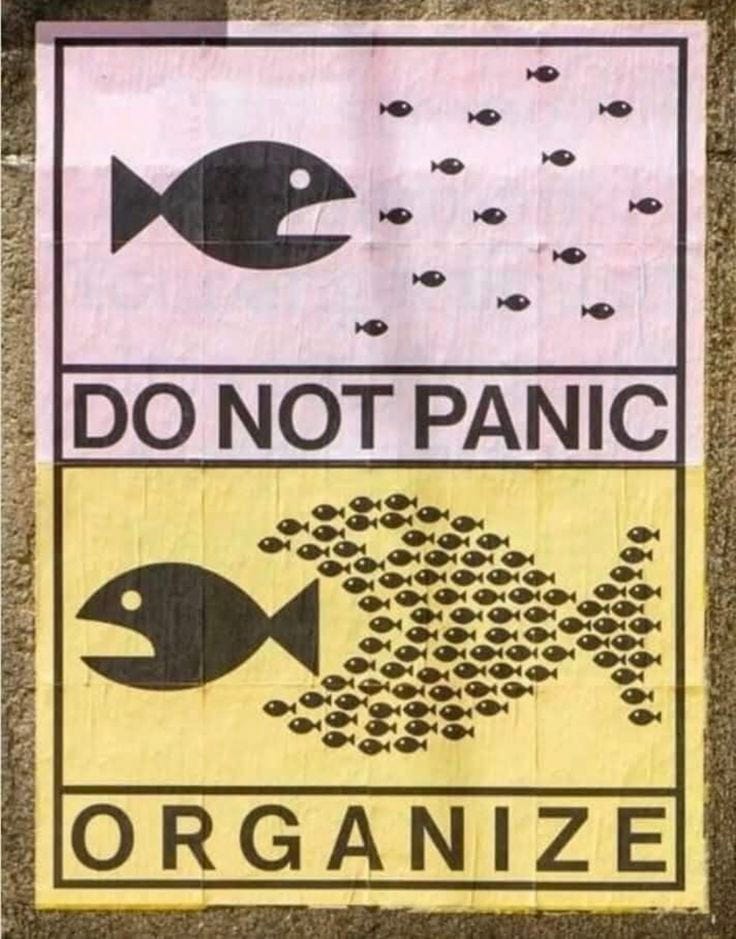
Brussels: Two events for your calendar!
8 February 2025: Coffee Chats for Tired Rebels
Join us in Mazette on Saturday afternoon from 14h CET for a chilled coffee meetup around the topic ‘How do we fight the far-right without burning out?’ (And if you just want to stare into the void over a coffee, that’s fine too).
Stay tuned via our Instagram @thegreenfix_. All welcome.
26 February 2025: Climate Drinks!
The far-right aren’t the only people in town ;) Join us at Barcine from 18h CET to grab a drink with other people trying to make a difference. Networking optional, we just think eco-anxiety is best dealt with in good company. RSVP here.
What’s Going On?
How popular YouTubers influenced the US elections and push men far-right.
Related: I knew one day I’d have to watch powerful men burn the world down – I just didn’t expect them to be such losers.EU’s solar and wind growth pushes fossil-fuel power to lowest level in 40 years.
Related: How women in Zanzibar are retraining as solar technicians.Far-right in the EU launch attempt to restrict NGO funding.
Related: US climate denial group working with European far-right parties.Billionaire wealth increased 3x faster in 2024 (and they did not earn it).
Related: Oxfam calls for a campaign to tax the rich.Serbian Prime Minister resigns after student protests over corruption.
Related: Open letter by the Serbian students of the College of Europe.
If you’d like to support The Green Fix, please consider tipping us a virtual coffee or upgrading to a paid subscription.
Wildfires destroyed my home. Here’s what I did next.
Ana Alanis is a graduate student at UCLA, focusing on climate mental health, resilience policy, and sustainable food systems. She is originally from Northern California's Trinity Alps Wilderness, and now resides in Los Angeles.
This month, catastrophic wildfires hit Los Angeles, the city where I now live, and once again this viral quote is circulating on social media:
“Climate change will manifest as a series of disasters viewed through phones with footage that gets closer and closer to where you live until you're the one filming it.” (Source)
For me, that moment came in 2021, when my community in Northern California burned in a wildfire.
At the time, I was 25 years old, still trying to find my footing in the world and within the climate movement. I had worried for years about climate disasters, but on some level, I didn’t believe my family would ever be victims of such a tragedy.
Even before the fire, I experienced what’s often called “climate anxiety”—a heightened emotional, mental, or somatic distress in response to dangerous changes in the climate system. It’s a feeling shared by many of us: a groundbreaking 2021 study surveying 10,000 youth worldwide found that 75% of young people feel the future is frightening. Nearly half report their distress about climate change impacts their daily lives. More than half of respondents feel that governments have failed us, compounding climate distress with the feeling that help is not on the way.
At times, I had managed to channel my anxiety productively: canvassing for climate-conscious candidates with the political advocacy group Sunrise Movement, and preparing for worst-case scenarios by packing an evacuation “go bag.” But when one of my worst fears became a reality, I felt completely shattered and unmoored.
The weeks following the fire were a blur of poor sleep, busying myself with logistics to help my family, and moments of deep despair—for my community’s tragedy and the mounting toll of the climate crisis worldwide. Somewhere in that haze, I came across Dr. Katharine Hayhoe’s book, Saving Us: A Climate Scientist's Case for Hope and Healing in a Divided World. Her conviction that “one of the most important things we can do to fight climate change is to talk about it” gave me an achievable path forward when I felt desperate to find meaning in my pain.
I started writing in a journal and recording video diary entries to help me process my emotions and find my voice. In one entry, I listed the everyday sights and sounds from home I didn’t want to forget: my favorite spot in the backyard to look up at the trees, the sound of my parents coming up the front steps and pushing hard on our front door that had started to stick. In other entries, I reflected on the people and places I love most and what I want to fight to protect amidst the climate crisis.
I mustered modest courage to share my writing online for the first time on Medium. Encouraged by the experience, I sent the article to a journalist working on a piece about climate anxiety and disaster, expressing my interest in contributing.
A month later, I found myself on national news, speaking to an audience of two million people. Terrified but determined, I drew strength from the conviction of Dr. Hayhoe and the words of social activist Maggie Kuhn: “Speak, even when your voice shakes.”
In the year that followed, I threw myself into work and focused on others’ needs, largely neglecting my own. On the surface, I appeared high-functioning—I moved with my partner to a new city, started an exciting new job, and tried to stay engaged in climate activism.
But beneath the surface, the weight of unchecked grief and trauma quietly unraveled me. I suffered from chronic stress, nightmares, and depression, and for the first time, I engaged in self-harming behaviors and experienced passive suicidal ideation. Hitting this new emotional low jolted me to confront the depth of my pain and make a change. I was trying to outrun my grief when what I really needed was to slow down and tend to myself. As Audre Lorde famously said: “Caring for myself is not self-indulgence, it is self-preservation, and that is an act of political warfare.”
You may have heard the phrase, “action is the antidote to despair.” But from my personal experience, action alone isn’t a sustainable plan for activism—or for living a peaceful life. I began incorporating what climate-aware psychotherapist Caroline Hickman calls “internal activism,” which emphasizes that tending to our internal worlds is just as vital as external activism.
Internal activism means stretching our emotional window of tolerance—expanding our capacity to hold uncomfortable emotions like grief, fear, shame, and anxiety without being consumed by them, while also cultivating life-affirming capacities like love, joy, hope, creativity, and determination. Strategies include acknowledging and validating how climate change makes us feel, practicing nervous system regulation through mindfulness or time in nature, and building community with value-aligned people.
With ongoing practice, my updated approach to activism includes receiving mental health services and exploring non-Western healing practices to address both the acute trauma of the fire and deeper emotional wounds. My yoga practice and cooking help me reconnect with my body and cultivate a meaningful sense of grounding and safety. I’ve prioritized spirituality, deepening my relationships, and sought out community in climate-conscious spaces like Climate Farm School and Climate Cafes.
I’ve also continued to write, host workshops, and create under the umbrella project I call Hungry for Climate Action. Inspired by climate comedians like Esteban Gast, I even wrote a comedy set about my town burning down and performed it at an open mic.
Wherever you are on your journey, I hope you discover internal and external activism strategies that feel personally meaningful to you. Let yourself be held in community. Take breaks when you need them. Remember that rest, too, is a radical act. Share your story. Find ways to tap into your unique gifts and your love for this world.
Trust you are not alone and together, we’ll find a way forward—in honor of all we’ve lost and all we can still save.
You can follow Ana Alanis on her website and on Instagram @ana_alanis.
So Now What Do I Do?
PROTEST
Brussels: Next march for Palestine on the 9th February at 14h30 in Place Poelarts.
LEARN
Join Rainbow Mind's radical self-care workshops for activists (LGBTQIA+ BAPOC) starting today at 15h CET.
Check out this amazing-looking new climate newsletter Doomates!
Read: Trump’s “Shock and awe” plan is intended to overwhelm you in The Dean's Report by Dean Obeidallah.
HELP A CAMPAIGN
Share the #PowerBeyondPlatforms campaign to move away from Meta.
Sign and share the petition to protect reproductive care for women in the EU.
Follow us on Bluesky @thegreenfix.blsky.social!
The Green Fix is now offering low-cost sponsored slots on the newsletter. Book your slot by emailing wearethegreenfix@gmail.com.
Stay in the loop
You can follow us on Instagram @thegreenfix_ and LinkedIn. Connect with Cass on Instagram @cass.hebron, Bluesky @cass-hebron.bsky.social and LinkedIn.





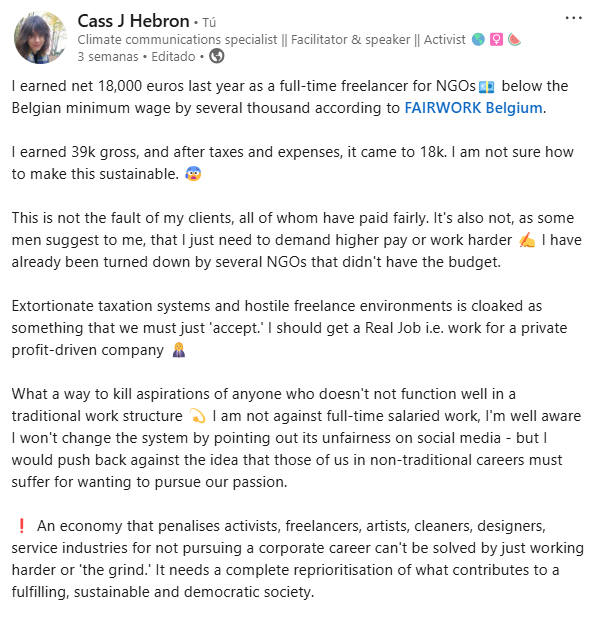
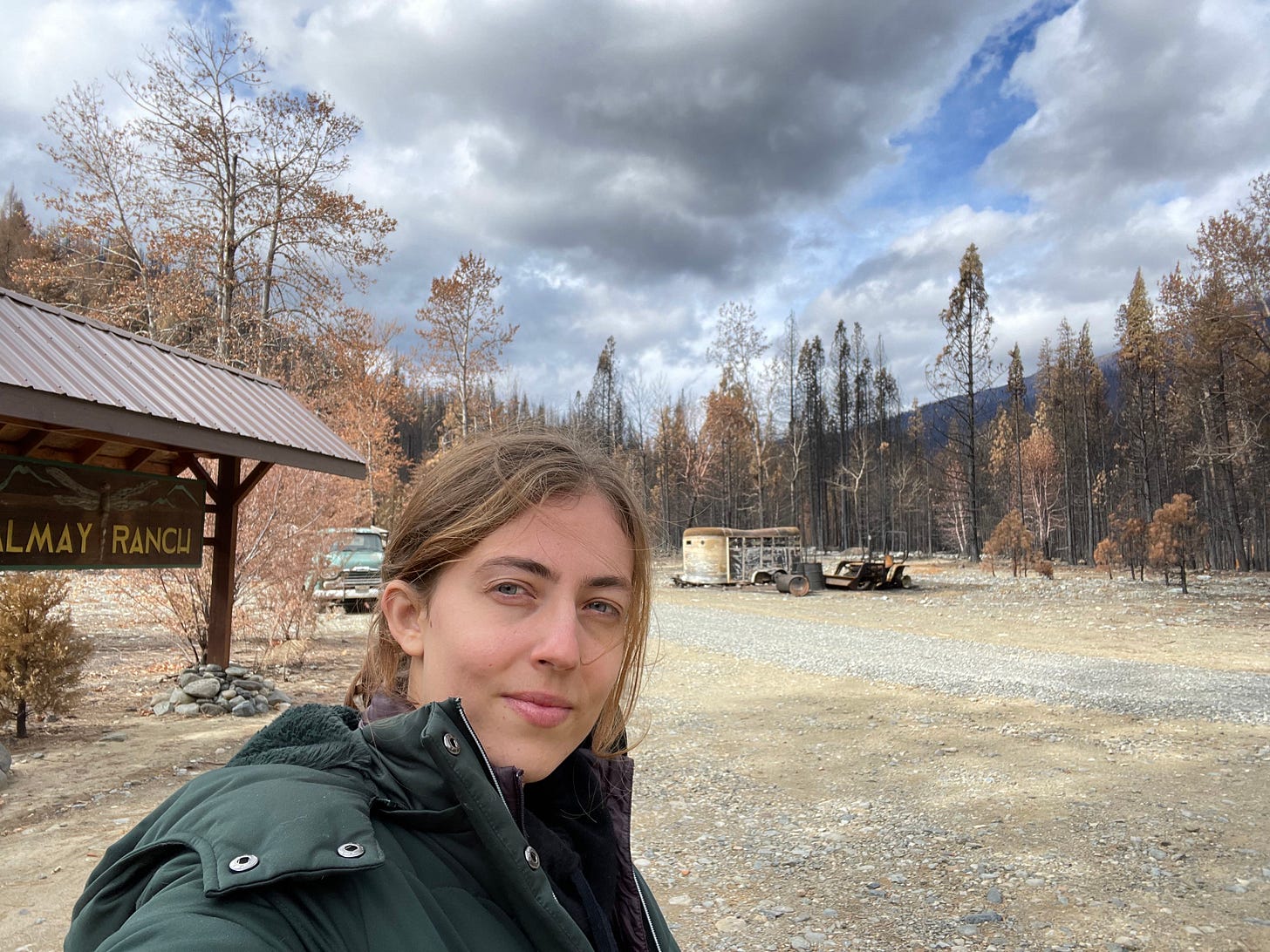

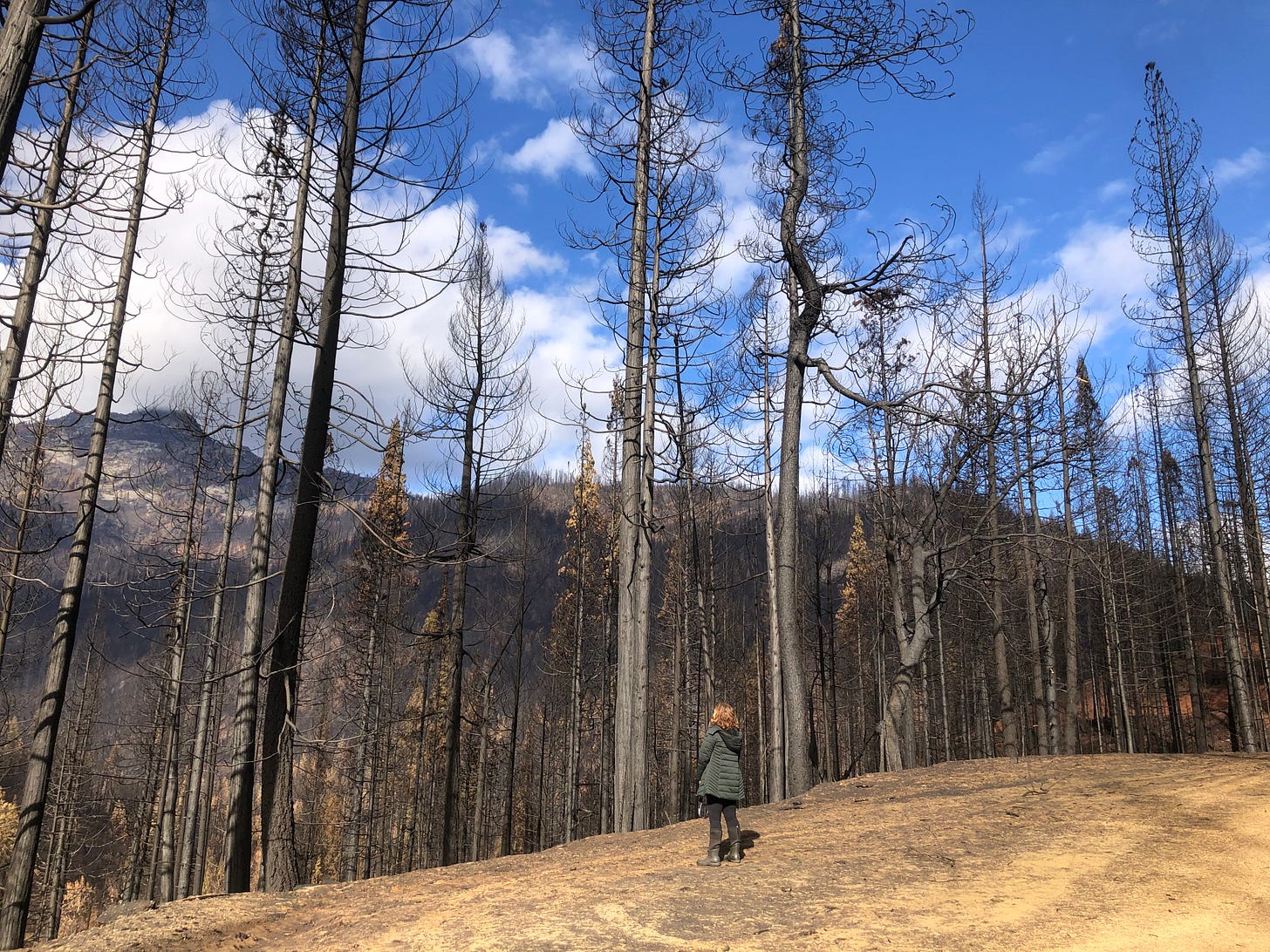
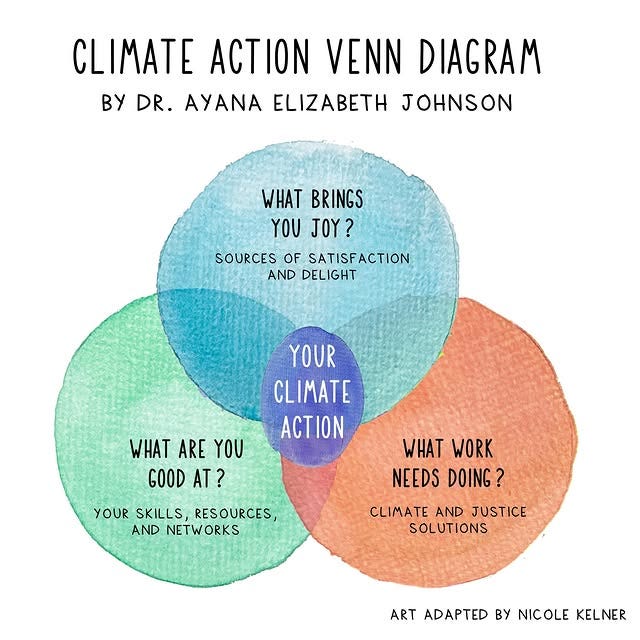

Hey, what percentage tax do you pay on your earnings in Belgium. I'm paying about 25% in France. But that money goes to fund services like free or cheap healthcare, transport, education, child care, sports, and more. Is it not the same in Belgium.
Awesome post, btw. Words like "hard truth" and "harsh realities" are a no-no for me now. They're often an aggressive way of couching an opinion as an irrefutable truth. And those opinions can usually be picked apart with a minimum of creativity, imagination or plain old empathy.
Super resources at the end, too. But my highlight of this post is "Be unrealistic". I'll make it my motto of the week.